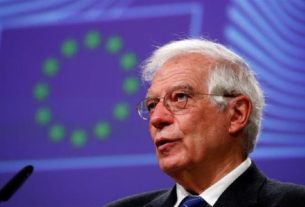Farmers in Spain have joined their European counterparts in staging protests across the country.
Like farmers elsewhere, they demand more flexibility from the European Union, tighter controls on the produce of non-EU countries and more help from their government.
In several regions, they blocked roads and caused severe disruption to motorists.
A large demonstration in central Madrid is planned for later this month.
On Tuesday, farmers took to the streets of agricultural areas in Spain’s northern interior, driving tractors in convoys, beeping horns, waving Spanish flags and brandishing placards.
They also protested in the north-eastern region of Catalonia, the southern region of Andalusia and Extremadura in the west.
Spain’s farmers have similar grievances to their counterparts in France, Belgium, the Netherlands, Italy and other countries that have been protesting recently.
They say that regulations which form part of the EU’s Common Agricultural Policy (CAP), along with high fuel and energy costs, make it difficult for them to make a profit.
“The costs, when it comes to producing wheat and barley, are very high,” said Esteban, a cereal farmer who preferred not to give his surname who was protesting in Aranda de Duero. “You’ve got to pay for fertiliser, pesticides, fuel – it’s killing us. We have to pay very high prices and yet we sell at low prices.”
Protesting French farmers accused Spanish producers of undercutting them by not fully observing EU rules. Last week, French former minister Ségolène Royal triggered controversy by claiming that Spanish organic tomatoes were “false organic”. Amid an angry backlash from the Spanish food and farming industry, Prime Minister Pedro Sánchez invited Ms Royal to try a Spanish tomato.
However, Spain’s agricultural sector in turn levels similar criticism at non-EU countries, such as its southern neighbour, Morocco, which it claims is not subject to the same environmental and sanitary regulations as European producers, allowing it to sell cheaper produce.
“We have to undergo a lot of controls, a lot of sanitary regulations which products from [non-EU countries] are not subject to,” said Estrella Pérez, who farms livestock and cereal.
“We just want a future for farming and right now, we don’t see it.”
The plight of Spanish farmers has been compounded by drought. Many areas of the country have not seen normal levels of rain in recent months which is affecting harvests. Spain is the world’s biggest olive oil producer, but prices have been pushed up by low production. Last week, Catalonia declared a state of emergency due to a three-year drought, the longest on record.
Elsewhere, Italian farmers have been gathering from north to south for a week, also protesting against EU regulations and red tape. They are planning to converge on Rome at the end of this week.
Prime Minister Giorgia Meloni has backed them, saying that the EU’s Green Deal will hit farmers’ lives disproportionately. But farmers are also concerned about government plans to end tax subsidies for the agricultural sector.
On Tuesday, EU Commission President Ursula von der Leyen announced she wants to withdraw a plan to slash the use of pesticides, describing it as “a symbol of polarisation”.
Belgian Prime Minister Alexander De Croo welcomed the announcement, saying it was “crucial we keep our farmers on board to a more sustainable future of farming, as part of our determination to get the Green Deal done”.__Courtesy bbc.com





